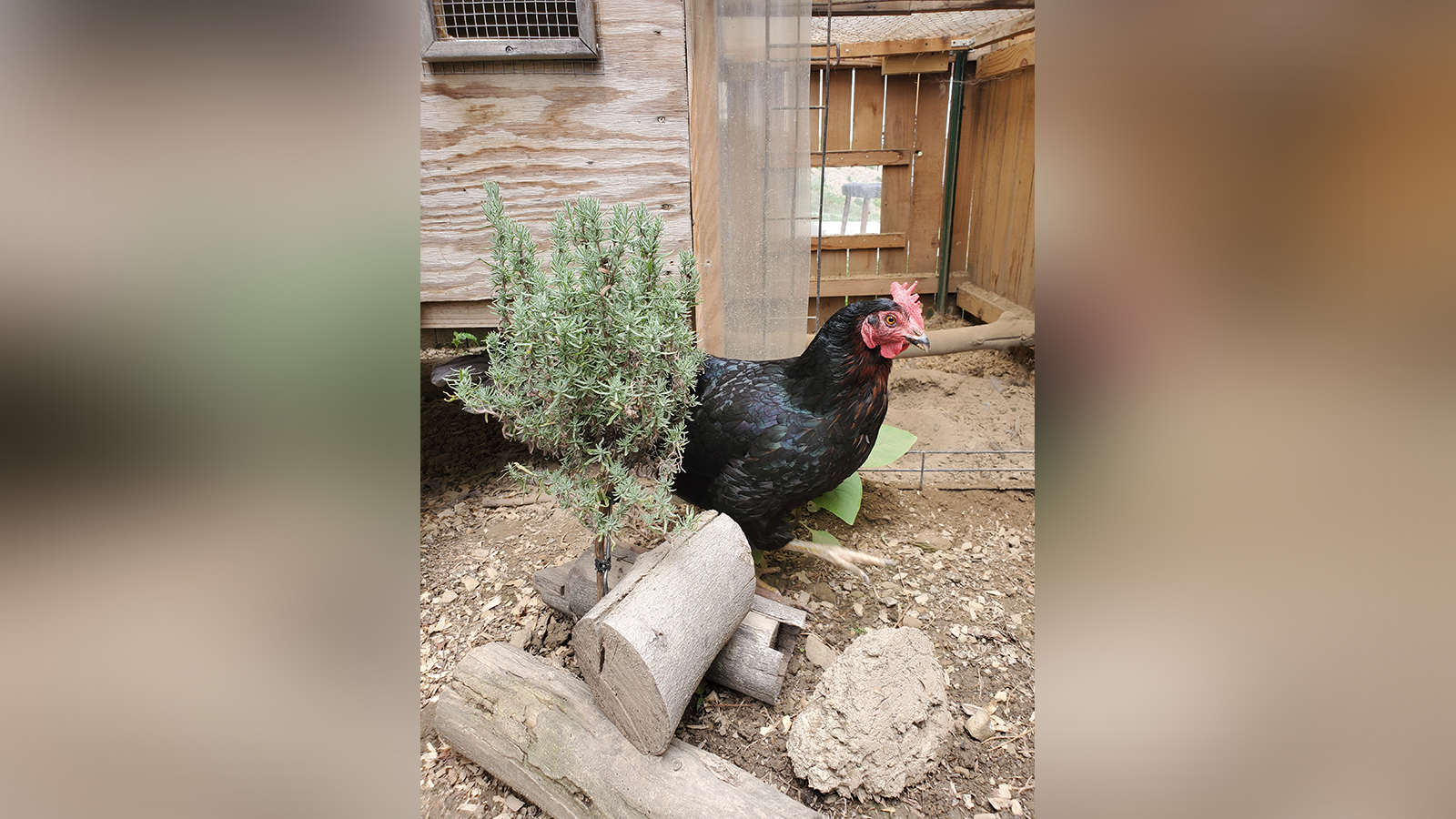This story was written for Very Local by Kristy Locklin. You can follow her on Instagram here.
Evergreen and Vicki are living their best life.
The chicks are the sole inhabitants of a mansion. They eat organic food, go on daily runs and wake the neighbors with their constant cackling.
Like a mother hen, Natalie Coccia watches them from her kitchen window.
“If you want chickens,” she says, “be prepared to spend a lot of money and have no social life.”
Coccia resides in Avalon, a borough six miles from Downtown Pittsburgh. After a lengthy permitting process, she adopted four birds, adding to a menagerie that includes two cats, two dogs and three rabbits.
When raccoons killed half of her beloved brood, she built a fortified coop, complete with heaters, elaborate nesting boxes and an 8-foot-fence around it. She controls a backyard surveillance camera with her iPhone. If Coccia is out on a date and a potential predator appears on the screen, she screams into the device to shoo them away.
“I swear I’m not a Crazy Chicken Lady,” she says with a laugh. “I just spent $5,000 on a coop for two chickens. I mean, I could potentially live in there. But I have the happiest chickens in the world. They’re like miniature dogs. They have personalities, love treats and they know their names.”
Why urban chickens?
Urban chickens are popular pets in Avalon and the surrounding neighborhoods. The mom-and-pop hardware store keeps chicken feed in stock and the Nextdoor app is regularly awash in tongue-in-cheek reports of wayward chickens crossing the road.
Local laws differ from municipality to municipality, but the City of Pittsburgh’s urban agriculture zoning code allows for residents to keep honey bees, ducks, goats and up to five chickens within 2,000 square feet or more of land (including the footprint of the home).
Grant Saylor, co-owner and head brewer at Lincoln Avenue Brewery in Bellevue, gives away spent grain to area chicken owners.
[Did you know Bellevue used to be a dry town? Check out our story to learn more about the history of Lincoln Avenue Brewing.]
During the beer-making process, the grain is boiled to remove the sugars, but the proteins remain, making it great grub for famished fowl.
Saylor, who strives to make the brewery a zero-waste business, leaves hundreds of pounds of wet feed in buckets on the side of the building.
It’s a beneficial situation for everyone involved. The chickens get a free, tasty meal and their owners usually stop and have a pint while they’re making the pickup.
“They get the byproduct and then they come in and buy product,” Saylor says.
Evergreen and Vicki are fans of the feed, but they also enjoy corn on the cob, pumpkins, watermelons and table scraps, including their own eggshells, which boosts their calcium levels.
In the spring and summer, the hens each lay one egg a day. Coccia says they’re delicious and have bright, orange yolks. The eggs have 1/3 less cholesterol, 1/4 less saturated fats and twice the Omega-3 fatty acids of the store-bought variety.
She’ll often make an omelette for dinner and sit at the kitchen table with a glass of wine and a chicken cradled in her arms.
Birds of a feather cluck together
Jamie Parker’s pet Henrietta wasn’t as docile upon her adoption. The bird’s former owner dubbed her Mrs. Pecks-A-Lot.
After a few months at Parker’s Penn Hills home, however, her attitude changed from bad egg to best friend.
“She was very affectionate and would just jump on your lap to sit or get head scratches,” she says.
Henrietta and her feathered pal Lucifer both passed away in 2020. Now Parker and her boyfriend, Scott Blades, look after Esmeralda and Sophia (named after “The Golden Girls” matriarch).
Parker has always been afraid of birds, but curious about them at the same time. As a vegan, she wanted to find a way to increase her advocacy, help animals in need and overcome her phobia.
When a family member invited her over to check out his backyard coop, she fell in love with winged creatures and hatched a plan to get some of her own.
Like Coccia, Parker and Blades erected a condo for the cluckers on their property. The coop has windows and vents for air circulation, which is important for the birds’ delicate respiratory systems. The building is filled with plants and enrichment toys. They have a large, outdoor area with a roosting bar and a protective netting over it.
Since their setup is attached to the couples’ house, they can head into the garage via a tiny door to seek refuge from the sun, rain or cold weather.
Parker owns Sweet Alchemy Bake Shop, an all-vegan bakery in New Kensington. The birds are featured prominently on the businesses’ social media pages, but their eggs never go into the batter. They barely produce them anyway.
“As a vegan, I believe they are valued for more than their egg production,” Parker says. “Chickens are really smart, have interesting ways of communication and are fascinating beings to watch. They make this adorable noise, called trilling. They do it when they are happy, content, and it’s the cutest thing ever.”
Part-time pecking
(yes, you can rent backyard chickens)
People interested in trying their hand at hen ownership can contact Rent The Chicken.
Based in Freeport, Pa., owners Jenn and Phil Tomkins launched the business in 2013 to earn extra income. Now it’s their full-time job. They have a network of chicken farmers across the United States and Canada that can help novices start their fowl adventure.
Participants, including schools and libraries, can rent an incubator for five weeks at a time to hatch chicks. After a couple of weeks, the birds are returned to the farm. People also can rent a portable coop and hens that are between six months and two years old. Chickens have their highest egg production during their first three years of life.
The company saw an increase in rentals during the pandemic, as chicken-raising is a great quarantine activity.
Rent The Chicken offers free delivery to Pittsburgh and other sites within 50 miles of Freeport. The starter kit includes two to four egg-laying hens, 100 to 200 pounds of feed, food and water bowl and a chicken-keeping book.
The guests will start dropping eggs within two days of their arrival. As the rental period draws to a close, customers can opt to keep the chickens and all of their supplies.
Create a poultry playground in your back yard
Now through November, the company is accepting reservations for the 2021 Rent The Chicken and Hatch The Chicken season. Packages run between $450 and $850. Through a partnership with The Chicken Network, you can even create a poultry playground in your back yard, with Amish-built, chicken-sized swing sets, monkey bars and teeter totters.
Coccia, who obtains her chickens from a family friend in Hermitage, Pa., says she’ll probably always have a flock occupying her back yard.
“They could leave if they wanted to,” she says. “Sometimes I’ll let them out in the morning and won’t see them until it gets dark, but they always come back. They’re happy and bougie, but they decide what they want to do.”







